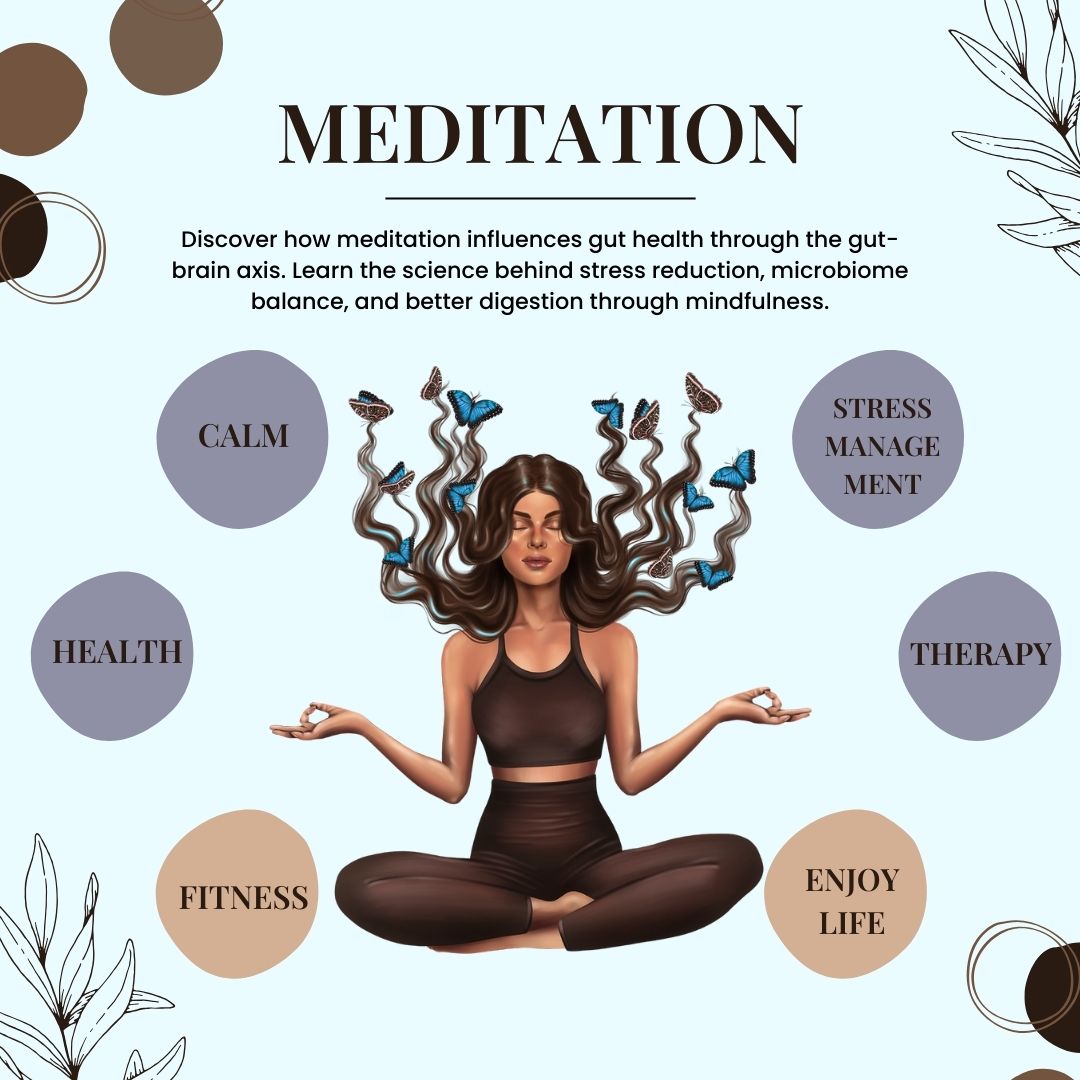🧘♀️ Meditation and Gut Health: The Powerful Connection You Didn’t Know About
For decades, meditation has been linked to mental clarity, emotional balance, and reduced stress. But a lesser-known benefit lies deep in your gut health—literally.
Recent scientific research reveals a powerful communication link between the brain and the gut, known as the gut-brain axis. Surprisingly, meditation plays a vital role in regulating this system, supporting digestion, reducing bloating, and even boosting your immunity.
In this article, we’ll explore:
-
How meditation and gut health are connected
-
The science behind the gut-brain axis
-
Simple meditation practices that support digestion
🧠💚 What Is the Gut-Brain Axis?
The gut-brain axis is the two-way communication network between your central nervous system and gastrointestinal system.
Here’s why it’s so important:
✔️ The gut has over 100 million neurons—it’s often called the “second brain”
✔️ It produces neurotransmitters like serotonin and dopamine, which influence mood and appetite
✔️ Your gut bacteria (microbiome) directly impact your brain and immune function
When you’re stressed or anxious, this system can go haywire—causing:
-
Indigestion
-
Inflammation
-
Leaky gut
-
IBS (Irritable Bowel Syndrome)
That’s where meditation steps in.
🧘♂️ How Meditation Benefits Gut Health
1. Reduces Stress Hormones That Disrupt Digestion
Stress activates the fight or flight mode and releases cortisol and adrenaline—both of which slow digestion and cause:
-
Bloating
-
Constipation
-
Poor nutrient absorption
Meditation triggers the “rest and digest” state, calming the nervous system and promoting optimal digestive function.
2. Balances the Gut Microbiome
Your gut is home to trillions of microbes. Stress throws them off balance, but meditation can:
-
Lower inflammatory markers
-
Support beneficial bacteria
-
Improve gut diversity
📌 A 2020 study in General Psychiatry found meditation improved gut microbiota diversity in participants with anxiety.
3. Reduces IBS and IBD Symptoms
Both IBS and IBD are stress-sensitive conditions. Meditation, especially Mindfulness-Based Stress Reduction (MBSR) techniques, have been shown to:
-
Reduce abdominal discomfort
-
Improve gut motility
-
Decrease bloating
📊 A University of North Carolina study reported a 38% reduction in IBS symptoms after 8 weeks of mindfulness meditation.
4. Enhances Digestion Through Breath Awareness
Diaphragmatic breathing (common in meditation) stimulates the vagus nerve—which helps control digestion.
Benefits include:
-
Faster digestion
-
Less gas and cramping
-
Better nutrient absorption
Even 2–3 minutes of breath-focused meditation before a meal can make a difference.
5. Reduces Emotional Eating and Food Cravings
Emotional triggers like stress and boredom often lead to binge eating. Meditation teaches you to:
-
Notice emotional cues
-
Pause before reacting
-
Choose food more mindfully
✅ Mindful eating has been proven to reduce binge eating and promote healthier food habits.
✨ Simple Meditation Techniques for Gut Health
🌀 1. Deep Belly Breathing (2–3 minutes)
-
Inhale through the nose for 4 seconds
-
Feel the belly rise
-
Exhale through the mouth for 6 seconds
-
Repeat for 2–3 minutes
📌 Best Time: Before meals
🔍 2. Mindful Body Scan (5–10 minutes)
-
Close your eyes
-
Mentally scan your body from head to toe
-
Focus on the belly or gut area
-
Breathe into areas of tension
📌 Best Time: Morning or bedtime
🙏 3. Gratitude Meditation for Meals (30 seconds)
Before eating, pause to:
-
Thank the source of your food
-
Set an intention to eat slowly and mindfully
📌 Best Time: Before every meal
🥦 Combine Meditation with Gut-Friendly Habits
To supercharge gut health, pair your mindfulness routine with:
-
High-fiber foods: fruits, vegetables, legumes
-
Probiotics: yogurt, kefir, kimchi
-
Hydration: 6–8 glasses daily
-
Better sleep
-
Less sugar and processed food
Together, they form a gut-healing lifestyle.
🌟 Final Thoughts: A Healthy Gut Starts in the Mind
Meditation does more than calm your thoughts—it heals from the inside out. It strengthens the gut-brain axis, supports your microbiome, and eases digestive issues like bloating and IBS.
Even 5 minutes a day can lead to:
Meditation and Gut Health: The Powerful Connection You Didn’t Know About
For years, meditation has been praised for improving mental clarity, reducing stress, and enhancing emotional well-being. But did you know that mindfulness practices can also positively influence your gut health?
Modern science is uncovering just how deeply your mind and gut are connected. This powerful communication network, called the gut-brain axis, reveals that your emotional and psychological state directly impacts your digestive system. And vice versa.
In this article, we’ll explore:
-
How meditation influences gut health
-
The science behind the gut-brain connection
-
Simple meditation techniques to support digestion
-
Lifestyle tips to optimize your microbiome
-
Real-life inspiration—from athletes to everyday Americans
Whether you’re someone managing IBS, struggling with bloating, or simply want better digestion, this guide will help you understand why healing your gut starts in your mind.
🧠 What Is the Gut-Brain Axis?
The gut-brain axis is a two-way communication highway between your gastrointestinal system and your brain. Far from being “just” a digestive organ, your gut is home to:
-
Over 100 million neurons (earning it the name “second brain”)
-
Neurotransmitters like serotonin and dopamine—the same chemicals that affect mood and mental focus
-
A microbiome of trillions of bacteria, which influence immunity, weight, cravings, and even behavior
This axis helps explain why anxiety can cause stomach pain—or why gut imbalances can lead to depression.
🧬 Gut Issues Triggered by Stress
When stress, anxiety, or poor sleep disrupt your system, it can result in:
-
Indigestion
-
Irritable Bowel Syndrome (IBS)
-
Inflammation
-
Leaky gut
-
Hormonal imbalances
And that’s where meditation becomes your secret weapon.
🧘 How Meditation Supports Gut Health
1. Reduces Stress Hormones That Slow Digestion
When you’re stressed, your body activates the sympathetic nervous system, releasing cortisol and adrenaline. These hormones shut down digestion so your body can “fight or flee.” But chronic stress means:
-
Bloating
-
Constipation
-
Poor nutrient absorption
-
Sluggish metabolism
Meditation helps you switch to parasympathetic mode—often called “rest and digest”—which promotes optimal gut function.
2. Balances Gut Bacteria (Microbiome)
Your gut is like a rainforest of microbes—some good, some bad. Stress disrupts the harmony of this ecosystem. Meditation helps restore that balance by:
-
Lowering inflammatory cytokines
-
Promoting beneficial bacteria
-
Enhancing gut flora diversity
🧪 A 2020 study in General Psychiatry found that meditation practices led to improved gut microbiome diversity in participants with anxiety.
3. Reduces IBS and IBD Symptoms
Conditions like Irritable Bowel Syndrome (IBS) and Inflammatory Bowel Disease (IBD) are worsened by mental stress. Meditation—especially programs like Mindfulness-Based Stress Reduction (MBSR)—helps:
-
Decrease abdominal pain
-
Improve gut motility
-
Ease bloating and gas
🎓 A study from the University of North Carolina reported a 38% reduction in IBS symptoms after just 8 weeks of mindfulness meditation.
4. Improves Digestion via Breathwork
Slow, diaphragmatic breathing (a key component of meditation) activates the vagus nerve, which controls digestion. This:
-
Improves gastric emptying
-
Boosts nutrient absorption
-
Calms stomach spasms
-
Reduces acid reflux
Even 2–3 minutes of mindful breathing before meals can make a noticeable difference.
5. Reduces Emotional Eating and Food Cravings
How many times have you reached for a snack out of stress, not hunger?
Meditation teaches you to:
-
Identify emotional triggers
-
Pause before reacting
-
Eat more mindfully and slowly
📘 Mindful eating has been shown to reduce binge eating and emotional food choices by up to 50% in some studies.
🧘 Simple Meditation Techniques for Better Gut Health
1. Deep Belly Breathing (2–3 minutes)
How:
-
Sit or stand upright
-
Inhale through your nose for 4 seconds, expanding your belly
-
Hold for 2 seconds
-
Exhale slowly through your mouth for 6 seconds
-
Repeat for 2–3 minutes
Best time: Before meals or during gut discomfort
2. Mindful Body Scan (5–10 minutes)
How:
-
Lie down or sit comfortably
-
Close your eyes
-
Mentally scan your body from head to toe
-
Breathe into tense areas, especially the abdomen
-
Observe sensations without judgment
Best time: Morning or bedtime
3. Gratitude Meditation Before Meals (30 seconds)
How:
-
Sit for a moment before eating
-
Acknowledge the source of your food
-
Set an intention to eat slowly and chew thoroughly
Why it works: It relaxes your nervous system, making digestion more efficient.
🥦 Combine Meditation With Gut-Friendly Habits
To fully support your digestion, pair your mindfulness routine with:
| Habit | Benefit |
|---|---|
| Probiotic foods (yogurt, kefir, kimchi) | Boost microbiome |
| Fiber-rich meals (fruits, oats, legumes) | Feed good bacteria |
| Hydration (6–8 glasses/day) | Prevent constipation |
| Sleep (7–8 hrs) | Supports gut repair |
| Limit sugar and processed foods | Reduces inflammation |
Need a gut health booster? Try this probiotic formula on Amazon 👉 https://amzn.to/4l0dKrt
🏈 Real-Life Examples: From Sports to Cities
Even athletes and professionals are now turning to meditation to improve performance and gut health.
-
Mike Yastrzemski, outfielder for the San Francisco Giants, credits mindfulness for helping him stay focused under pressure and recover faster—both mentally and physically.
-
NFL quarterback Kyle Allen has spoken about using breathing exercises to calm anxiety and maintain digestion during high-stress games.
Whether you’re living a fast-paced life in Guadalajara – New York RB travel routes or battling Lyme disease, stress plays a major role in recovery—and gut health.
🗽 Daily Gut-Health Routine for Americans
Morning:
-
Start with 5 minutes of deep breathing
-
Drink warm lemon water
-
Eat a fiber-rich breakfast with probiotics
Afternoon:
-
Practice a 2-minute gratitude meditation before lunch
-
Walk after meals to aid digestion
Evening:
-
Do a body scan or guided meditation before bed
-
Avoid screens and heavy meals 2 hours before sleeping
✨ Final Thoughts: Healing Begins in the Mind
Meditation isn’t just for stress—it’s a transformative practice that improves your physical health, especially your gut. By lowering inflammation, balancing your microbiome, and reducing emotional eating, mindfulness can heal your gut from the inside out.
Start small. Even 5 minutes a day can lead to:
✅ Better digestion
✅ Fewer cravings
✅ Less bloating
✅ Stronger immunity
The gut is your second brain—nourish it with breath, calm, and intention.
Recommended Probiotic for Digestive Support 👉 https://amzn.to/4l0dKrt
For more mindful living and wellness guides, visit FitForevers.com—where gut health meets mental peace.
✅ Better digestion
✅ Fewer cravings
✅ Stronger immunity
✅ More energy
So next time your stomach feels off, try sitting still, breathing deeply, and letting mindfulness guide the way. Your gut will thank you.


One thought on “Meditation and Gut Health: The Surprising Mind-Body Connection Backed by Science”